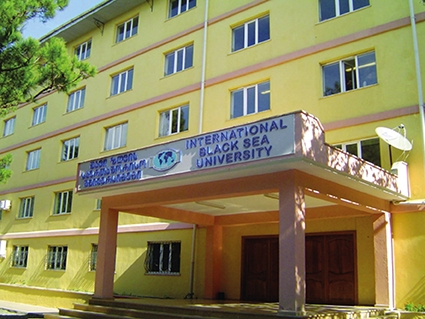The IBSU Conundrum
Teachers, students and students-to-be all took to the streets when the news broke that the International Black Sea University, one of the most highly regarded universities in the country, wouldn’t be admitting new students into its ranks this year. The Authorization Council for General Educational Institutions, a body that makes decisions on the authorization of general educational institutions, has slapped the IBSU with what would be an equivalent of a transfer ban in FIFA’s terms – the University is prohibited from accepting new students for one year. The decision of the Council (comprised of a board of members appointed by the Prime Minister of Georgia) was apparently a response to an ongoing financial dispute the government and the learning institution have been involved in for some years now. And while on the surface it seems to be a simple “Do bad things and bad things will happen to you” scenario, the reality is far more complex.
According to the board, the debts that the university has might pose significant risks to the teaching process.
“The University has unpaid debts worth 700,000 GEL that it hasn’t paid to the government, in relation to that, all its movable and immovable properties have been frozen, as a penalty to avoiding the payment obliged by Georgian legislation, reads the Council’s statement. The Council Chariman, David Afrasidze, also wasted little time in taking a swipe at the IBSU administration, branding them irresponsible “in managing financial and material resources.”
It all looks quite grim – an unpaid debt, frozen assets and a seemingly irresponsible administrative body – from this perspective, the Council might even have been surprisingly lenient, contending with only a one-year ban. Strangely, though, the very same council granted authorization to the university for another six years after an expert group, chaired by a UK specialist, presented its assessment of the education and logistic standards at IBSU. It gets even stranger when you look at what the other side has to say – The Head of the Quality Enhancement Department at IBSU, Diana Mchedlishvili, noted that the sum in question is not related to the university’s academic programming and has been in dispute since 2013. Furthermore, the IBSU administration claims it has no qualms about paying off “the debt” if the ongoing court process is against them. So, effectively, the government punished them for a crime they are not yet convicted of and one might construe it as a means to influence the ongoing legal dispute and strong-arm the institution into paying. Additionally, despite the seizure of its assets, there is no question that the university has been successfully able to continue the teaching process with the existing students (to which an absolute majority of said students affirm) and would without problems handle a new contingent. However, the “ban” will incur around GEL 3 mln loss to the university, which, if anything, would complicate the matter of paying the initial debt in the first place. This, coupled with the fact that it was granted a 6-year authorization, is why the University finds the Council’s decision both unjust and illogical. And entirely illegal too. The administration posted a statement on their website in response to the Authorization Council’s decision:
“The authorization board has unlawfully denied the International Black Sea University the right to receive a new contingent of students for a one year period...
By the decision of the Authorization Board of Higher Educational Institutions on 20 August 2018, the International Black Sea University was granted authorization for six years. At the same time, the Board made a totally illogical and incompatible decision that contradicts the experts’ conclusion; it ignores the positive conclusion of experts and the University is forced to stop accepting new students until August 20, 2019. As a result, up to 800 students' choices to study at the International Black Sea University have been ignored and the Board has compelled them to apply to other higher educational institutions. The decision constitutes a threat to students’ legal preferences during two academic years...
“The irresponsible decision of the authorization board hinders the development of one of the leading and internationally recognized universities in Georgia...We apply to NGOs and international organizations, diplomatic corps and civil society to support the International Black Sea University in its fight against injustice. We refer to the Government of Georgia to take appropriate measures in order to prevent the damaging of the country’s international reputation, democratic values, freedom of entrepreneurial activity and to protect the educational sphere from unhealthy influences.”
And this is still not all: the conundrum is further complicated by loudly whispered speculation that external influences are behind the government body’s decision – The Erdogan government considers IBSU a terrorist organization, with Gulen links, and the Ambassador of Turkey in a recent interview said just as much, branding its rector “a terrorist who lives in Georgia” for good measure. So far, IBSU has spawned no terrorists or extremists of any sort, yet the Ankara-backed narrative has managed to achieve the closure of similar institutions, the Demirel College chief among them, in the past. Whether this too is a case of political strong-arming, time will show and soon, but the whispers are growing louder.
By The GT Team












